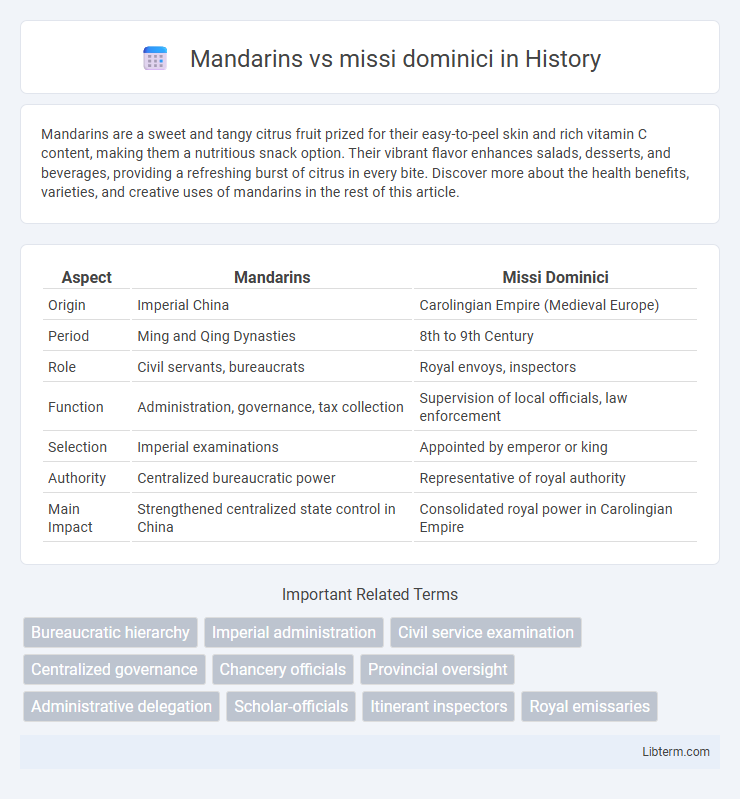Mandarins are a sweet and tangy citrus fruit prized for their easy-to-peel skin and rich vitamin C content, making them a nutritious snack option. Their vibrant flavor enhances salads, desserts, and beverages, providing a refreshing burst of citrus in every bite. Discover more about the health benefits, varieties, and creative uses of mandarins in the rest of this article.
Table of Comparison
| Aspect | Mandarins | Missi Dominici |
|---|---|---|
| Origin | Imperial China | Carolingian Empire (Medieval Europe) |
| Period | Ming and Qing Dynasties | 8th to 9th Century |
| Role | Civil servants, bureaucrats | Royal envoys, inspectors |
| Function | Administration, governance, tax collection | Supervision of local officials, law enforcement |
| Selection | Imperial examinations | Appointed by emperor or king |
| Authority | Centralized bureaucratic power | Representative of royal authority |
| Main Impact | Strengthened centralized state control in China | Consolidated royal power in Carolingian Empire |
Introduction to Mandarins and Missi Dominici
Mandarins were scholar-officials in Imperial China, selected through rigorous civil service examinations to administer government policies and maintain Confucian bureaucracy. Missi dominici were royal envoys in the Carolingian Empire, appointed by Charlemagne to oversee local administration and ensure loyalty to the central authority. Both roles functioned as critical intermediaries between central governments and regional jurisdictions, enforcing imperial or royal directives.
Historical Background: Origins and Evolution
Mandarins originated in imperial China as scholarly bureaucrats selected through rigorous civil service examinations during the Tang and Song dynasties, evolving into key administrators in a centralized government. The missi dominici were envoys established by Charlemagne in the Carolingian Empire around the 8th century to oversee local administration and ensure royal authority across diverse territories. Both systems reflect early efforts to enhance governance through appointed officials, with mandarins emphasizing merit-based civil service and missi dominici focusing on direct royal supervision.
Roles and Responsibilities
Mandarins served as bureaucratic officials in imperial China, primarily responsible for administration, tax collection, and implementing the emperor's policies across provinces. Missi dominici were royal envoys in the Carolingian Empire tasked with overseeing local authorities, ensuring the enforcement of laws, and reporting directly to the emperor. Both roles functioned as critical intermediaries between central authority and regional governance but differed in cultural context and specific duties.
Structure and Hierarchy
Mandarins were civil officials in imperial China serving within a rigid bureaucratic hierarchy, selected through rigorous Confucian examinations, ensuring a meritocratic governance structure. Missi dominici were royal envoys in the Carolingian Empire, acting as overseers who monitored local administration and reported directly to the monarch, embodying a more decentralized and temporary authority. The Mandarins formed a permanent, stratified civil service with defined ranks, while missi dominici operated as itinerant agents with authority that varied according to royal appointment and strategic needs.
Geographic Influence: China vs. Medieval Europe
Mandarins in China exerted centralized control through a vast bureaucracy rooted in Confucian principles, shaping governance and culture across East Asia. Missi dominici in Medieval Europe operated as royal envoys enforcing imperial authority across fragmented territories within the Carolingian Empire, primarily in present-day France and Germany. The geographic influence of Mandarins emphasized bureaucratic order and cultural unity in a continuous empire, while missi dominici reflected a decentralized, feudal landscape requiring direct oversight to maintain regional loyalty.
Methods of Governance and Administration
Mandarins, the scholar-officials of imperial China, governed through a centralized bureaucracy emphasizing Confucian principles, rigorous civil service examinations, and merit-based appointments. Missi dominici, appointed by the Frankish kings during the Carolingian Empire, operated as royal agents traveling across the realm to supervise local administration, enforce justice, and report back to the monarch, ensuring loyalty and standardized governance. The mandarins' method relied on a professional, educated elite system embedded within a stable bureaucratic hierarchy, whereas the missi dominici employed direct oversight and inspection to maintain control over diverse and decentralized territories.
Impact on Centralization of Power
Mandarins in imperial China served as a merit-based civil bureaucracy, significantly strengthening centralized governance by ensuring loyalty and administrative efficiency directly under the emperor's control. In contrast, the missi dominici, Frankish royal envoys appointed by Charlemagne, acted as inspectors enforcing royal authority across distant provinces but relied heavily on local lords, which sometimes limited their effectiveness in consolidating power. The mandarin system institutionalized a stable, centralized bureaucratic state, whereas the missi dominici represented an early, more fragmented effort to impose royal oversight on diverse territorial jurisdictions.
Cultural and Political Significance
Mandarins were scholar-officials in imperial China who embodied Confucian ideals, serving as the administrative backbone of the centralized bureaucracy and shaping cultural values through education and governance. Missi dominici were royal envoys in the Carolingian Empire, representing the king's authority to oversee local administration and justice, reinforcing political control across vast territories. Both roles held critical political significance by ensuring centralized governance, while culturally, mandarins influenced Confucian statecraft, and missi dominici reinforced feudal loyalty and royal oversight.
Legacy and Long-term Influence
Mandarins shaped Chinese bureaucracy through a merit-based examination system influencing civil service across East Asia for centuries. Missi dominici reinforced Carolingian authority by inspecting local officials, laying groundwork for centralized medieval European governance. Both institutions established enduring models for administrative oversight and state control in their respective cultures.
Comparative Analysis: Mandarins vs. Missi Dominici
Mandarins were civil servants in imperial China, selected through rigorous examinations to administer local governance and enforce Confucian principles, whereas missi dominici were royal envoys in the Carolingian Empire tasked with overseeing regional authorities and ensuring loyalty to the king. Both systems aimed to extend central authority and maintain administrative control, but mandarin officials derived legitimacy from meritocratic bureaucracy while missi dominici operated through direct royal appointment and military authority. The mandarin system emphasized long-term bureaucratic stability, contrasting with the missi dominici's more ad hoc, mission-driven oversight.
Mandarins Infographic

 libterm.com
libterm.com